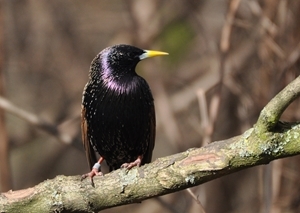 The Game and Wildlife Conservation Trust (GWCT) is giving farmers an opportunity of learning how to identify the everyday birds that live on their farms by attending a farmland bird ID day on the 28th January at Bank House Farm, Rawclifffe Bridge near Goole.
The Game and Wildlife Conservation Trust (GWCT) is giving farmers an opportunity of learning how to identify the everyday birds that live on their farms by attending a farmland bird ID day on the 28th January at Bank House Farm, Rawclifffe Bridge near Goole.
The aim of the training is to help farmers participate in the GWCT’s 2015 Big Farmland Bird Count which will take place between 7th and 15th February 2015.
Guy Smith, vice-president of the National Farmers Union (NFU) is a huge enthusiast of the GWCT’s Big Farmland Bird Count and said, “I often hear farmers grumble that while they are quietly proud of how much wildlife they have on their farms they get fed up with reports that modern farming is bad for birds. I can understand the frustration but to my mind the answer is, don't just be proud - be loud. So, come next February get the binoculars out, dust off the note pad, sharpen the pencil and get recording as you go out and about on the farm; then post your results to GWCT. We're always interested in how many tonnes of wheat we can get to the hectare, now let's systematically record how many bird species we can achieve per farm.”
The ID day will last for 2 ½ hours and is being run by local expert birder Chris Thomson from the RSPB. As places are limited, it is important that people book in advance online at www.gwct.org.uk/BFBC. A free bird identification guide will be available on the ID day as well as being available on the GWCT website. Illustrations for the guide have been kindly provided by the RSPB.
The GWCT believes that the efforts being made by farmers to reverse bird declines frequently go unrecognised despite them being vital in safeguarding the future of many of our most cherished bird species such as skylark, yellowhammer, corn buntings and wild grey partridges.
Jim Egan from the GWCT explains, “Our Big Farmland Bird Count helps to remedy this as it showcases some of the remarkable conservation efforts being carried out by farmers, landowners and gamekeepers such as providing supplementary over-winter food or by growing wild bird seed mixes. It is also a useful way to measure how birds are faring on our farms across the country. Once farmers are more aware of what birds they have on their farm, they can more accurately target the recovery of individual species by putting in place specific conservation measures. We hope that even more people will register to join the BFBC in 2015 to make it even more successful.”
For those interested in taking part in the Big Farmland Bird Count, the GWCT is providing a simple tick sheet that can be downloaded from the GWCT’s website and taken into the field to record any sightings. Participants will then be able to send the results either via a dedicated web page or through the post. The GWCT is inviting people to spend about half an hour recording the species and number of birds seen on one area of the farm.
The GWCT’s Big Farmland Bird Count has captured the imagination of all those interested in the future of farmland birds. Sponsored by BASF, the count is run in partnership with the FWAG Association and LEAF and receives grateful support from a wide range of farming and industry organisations such as RSPB, Kings, Waitrose, NFU, Soil Association, CFE, CLA, Heather Trust, Conservation Grade, and Countryside Alliance. For more information about the Big Farmland Bird Count, please contact Morag Walker on 01425 651000 or by email at mwalker@gwct.org.uk.
END
Photocaption: Starlings were seen on over 40% of the farms taking part in the GWCT’s 2014 Big Farmland Bird Count and were the most abundant bird recorded. Starling numbers have declined markedly across much of northern Europe and the UK. Picture credit: Peter Thompson, GWCT.
Notes to editors
The Game & Wildlife Conservation Trust – providing research-led conservation for a thriving countryside. The GWCT is an independent wildlife conservation charity which has carried out scientific research into Britain’s game and wildlife since the 1930s. We advise farmers and landowners on improving wildlife habitats. We employ more than 60 post-doctoral scientists and other research staff with expertise in areas such as birds, insects, mammals, farming, fish and statistics. We undertake our own research as well as projects funded by contract and grant-aid from government and private bodies.
For information, contact:
Eleanor Williams
Telephone: 07592 025476
Email: press@gwct.org.uk